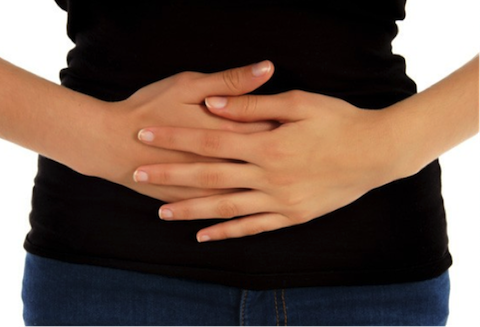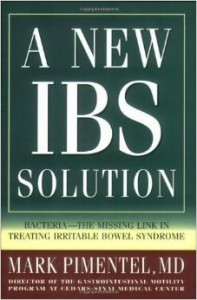
During season 3 of The Anxiety Summit, I interviewed Dr. Allison Siebecker on Small Intestinal Bacterial Overgrowth and Anxiety.
I talked about the SIBO Questionnaire I use with my clients and said I’d share it (with her permission).
There is a real SIBO-anxiety connection. I wrote about this in my book the The Antianxiety Food Solution.
Studies have found that people with digestive complaints such IBS, food allergies and sensitivities, small intestinal bacterial overgrowth and ulcerative colitis frequently suffer from anxiety and, to a lesser extent, depression (Addolorato, Mirijello, D’Angelo, Leggio, Ferrulli, Abenavoli, et al. 2008).
One study (Lydiard 2001) found that 50 to 90 percent of people with IBS who visited a doctor for treatment also suffered from various anxiety disorders (panic disorder, generalized anxiety disorder, social phobia, and post-traumatic stress disorder) and major depression.
I have all my clients who have any digestive issue (which is most of them), do the SIBO questionnaire and then talk to their doctor about doing the SIBO breath test/ hydrogen breath test or SIBO test. Genova offers this or you can ask your conventional doctor to order this.
Keep in mind that this is just one questionnaire/test of many that can be used to try and figure out the root cause of your anxiety. (I write about this and other questionnaires/testing here: Nutritional testing for figuring out the root cause/s of your anxiety.)
SIBO Symptoms, Clues and Associated Conditions
The main symptoms of SIBO are those of Irritable Bowel Syndrome (IBS). SIBO has been shown to exist in up to 84% of IBS patients and is therefore theorized to be the underlying cause. It is associated with many other disorders as well, as an underlying cause or as an after effect of the pre-existing disease.
In particular, if the symptoms of IBS are present, or one of the associated diseases along with digestive symptoms is present, consider SIBO.
According to Bures et al, “It is mandatory to consider SIBO in all cases of complex non-specific dyspeptic complaints (bloating, abdominal discomfort, diarrhea, abdominal pain), in motility disorders, anatomical abnormalities of the small bowel and in all malassimilation syndromes (malabsorption, maldigestion).”
Check off or highlight all that apply:
IBS Symptoms
Abdominal bloating (gas)
– belching, flatulence
Abdominal pain, cramps
Constipation, Diarrhea, both
Other symptoms
Heartburn (Reflux or GERD)
Nausea
Leaky Gut Symptoms (Leaky Small Intestine)
Food Sensitivities
Headaches
Joint Pain
Fatigue
Skin symptoms (such as eczema or rashes)
Respiratory symptoms (such as asthma)
Mood symptoms (depression/anxiety/OCD)
Brain symptoms (such as in autism)
Malabsorption Symptoms
Steatorrhea (fatty stool – stool that floats)
Anemia (Iron or B12)
Associated Conditions– see SIBO Diseases for Study links
Acne Roseacea
Acromegaly (excess growth hormone)
Age: Elderly
Alcohol Consumption (moderate intake)
Anemia
Autism
Celiac Disease
Chronic Fatigue Syndrome
CLL (Chronic Lymphocytic Leukemia)
Cystic Fibrosis
Diabetes
Diverticulitis
Erosive Esophagitis
Fibromyalgia
GERD (Gastroesophageal Reflux Disease)
H pylori Infection
Hyprochlorhydria/low HCl
Hypothyroid/ Hashimoto’s Thyroiditis
IBD (Inflammatory Bowel Disease)
-Crohn’s
-Ulcerative Colitis
IBS (Irritable Bowel Syndrome)
Interstitial Cystitis
Lactose Intolerance
Leaky Gut
Liver cirrhosis
Lyme
Muscular Dystrophy (myotonic Type 1)
NASH/NAFLD (non-alcoholic: steatohepatitis/fatty liver disease)
Obesity
Pancreatitis
Parasites
Parkinson’s
Prostatitis (chronic)
Restless Leg Syndrome
Rheumatoid Arthritis
Scleroderma
Surgery: Post-Gastrectomy
The above list of SIBO symptoms has been adapted from the site of Dr Allison Siebecker and used with permission here on the blog. Please check out Dr. Siebecker’s site siboinfo.com for a wealth of information about SIBO.
Risk factors/other possible clues*: (* all the following added by Trudy Scott, based on what I see with clients)
C-section birth (yours)
Not breast-fed
Probiotics cause digestive distress
Prebiotics (such as inulin) cause digestive distress
Have seen some symptom relief after a course of antibiotics
Symptoms appeared after a bad bout of gastroenteritis
Low triglycerides
Digestive enzymes help
Markers of poor enzyme status on a stool test
Pyroluria (see the Pyroluria Questionnaire here)
Low niacinamide
Low ferritin
Low vitamin D
Carb intolerance
Fat intolerance
Markers of fat malabsorption on a stool test
Low fatty acid levels on a fatty acid test
Have done well on gluten-free diet
Have done well on GAPs/Paleo diets (no grains, no starchy vegetables, no legumes)
Carb/sugar craving/addiction
Other addictions
Low zinc
Low GABA
Low serotonin
Low endorphins
Low catecholamines
Blood sugar issues (for low GABA/serotonin/endorphins/catecholamines and low blood sugar see Amino Acid Questionnaire here)
Stressed
Eat on the run i.e. not sitting down
Low secretary IgA (stool or saliva)
Adrenal fatigue
Heavy metals/environmental toxins
Appendix has been removed (it stores bacteria needed for motility motor complex)
Other possible causal factors **: (** added June 2017 after the MINDD 2017 practitioner conference, courtesy of the SIBO presentation by Dr. Nirala Jacobi ND)
Medications: Proton Pump Inhibitors, Opiates/pain meds, possibly calcium channel blockers
Endometrial surgeries, C-section, and/or gallbladder removal (cholecystectomy) and other pelvic surgeries (such as a hip replacement)
Testing:
Positive SIBO breath test (methane, hydrogen and a 3rd gas that can’t yet be measured)
Positive anti-Cdtb and anti-vinculin antibodies indicating post-infectious cause (details here)
Also, here is a more recent blog post on this topic: MINDD 2017 practitioner conference, courtesy of the SIBO presentation by Dr. Nirala Jacobi ND

